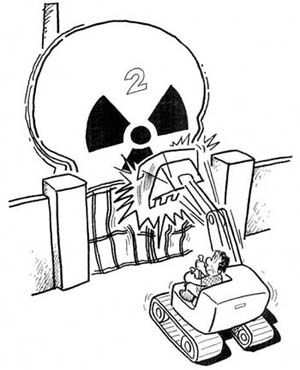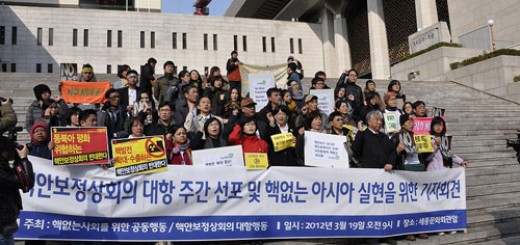No Nukes Asia Forum, Taiwan 2005 Nuke Info Tokyo No. 107
reconfirms declaration for nuclear phase-out and suspension of construction of Taiwan Nuclear Power Plant No. 4
The No Nukes Asia Forum (NNAF) was held from June 2nd to 8th in Taipei, Taiwan. There was a conference on the 4th and 5th and on the 7th there was a visit to the interim low-level radioactive waste storage facility on Orchid Island. The conference was sponsored by the Taiwan Environmental Protection Union (TEPU). Participants from countries other than Taiwan included nine people from South Korea from groups including the Korean Federation for Environmental Movement (KFEM) and Green Korea United (GKU), nine people from Japan and one person responsible for climate change issues from WISE Amsterdam. I only attended from the 3rd to the 5th, so this report will focus on that part of the forum.
June 3rd was devoted to study tours. In the morning we visited Taiwan Nuclear Power Plant No. 4 (NPP4), which is currently under construction. In the afternoon we visited NPP1 & NPP2. NPP4 is located at Lungmen, GongLiao Village, Taipei County. The most surprising thing for me was that erosion of Fulung Beach, the best beach in Taiwan, located in a national park, has become worse because of the construction of NPP4. The end of the bridge that goes down to the sand hill is already under water. We were told that in summer the beach used to attract bathers from all around the country, but now fewer and fewer people are coming. The local fisher people say that this is because the tides have changed as a result of the harbor built for NPP4. The day we visited, dredging was being undertaken offshore for the warm-water outlet from NPP4. According to the fisher people, as a result of the dredging the sea bed is covered with mud. This is devastating for the coral and makes it difficult for fish to survive. Also, fish don’t come near because of the noise from the dredging. As a consequence the fish catch has fallen dramatically. The fisher people complained bitterly that these circumstances have forced them to do part-time work to earn cash. According to Taipower construction is 60% complete.
 |
|
Cartoon by Shoji Takagi
|
We were only able to see NPP1 & NPP2 from the outside. After this excursion, a group from NNAF, along with about 20 Taiwanese people, went to the Jin San Town Hall, where discussions were held between citizens and Mr. Tiang1from the town hall. Speaking for the citizens was Mr. Xu1, a sturdy man of around 60. Apparently, a few years ago he took a shovel car to the front entrance of NPP2 and knocked it down. He was sentenced to a one-year prison term, suspended for five years. The five years isn’t up yet, so he’s still on a good behavior bond. Apart from such direct action, he also conducted a survey of deaths of residents based on family registers. He reported that of the 600 deaths in the five-year period from 1997 to 2002, 175 were from cancer, a much higher rate than in the past and nearly three times the average for the whole of Taiwan. This led him to believe that the cause of the high rate of cancer deaths in his town was radioactive emissions from the nuclear power plant. This conviction led him to knock down the front gate.
The distribution of iodine tablets was also discussed. The government decided to distribute them to all residents within a 5km radius of NPPs, although it hasn’t carried this out yet. This was an electoral policy agreement between TEPU and the Democratic Progressive Party (DPP). TEPU had demanded that they be distributed to people within a 32km radius, so they still have work to do to get their demands fully implemented.
The international conference was held on the 4th. It took place at the same venue as the 2002 NNAF (National Taiwan Normal University). The main themes were the Kyoto Protocol, which came into effect in February this year, nuclear industry trends, and the anti-nuclear energy movements of the participating countries. From Japan, I reported on the Kyoto Protocol and the Japanese nuclear industry, Kagoshima University professor, Takeo Hashizume, reported on wind energy and Kashiwazaki City Councilor, Tadao Yabe, reported on Japan’s anti-nuclear energy movement.
Kwanghoon Seok of Green Korea United reported on the situation of South Korea’s nuclear industry. At the moment there are twenty reactors operating in South Korea with four more under construction; and the government has decided to build a further twelve reactors. However this will be more difficult than before because of the citizens’ awareness of the dangers associated with nuclear power. As discussed below, public opposition has prevented the storage of radioactive waste outside nuclear facilities. Consequently, low, medium, and high-level wastes are all stored on site, (the high-level waste being spent fuel). Korea Electric Power Company has a nuclear liability fund (5-6 won/kWh) to cover management and disposal, but has been criticized for using this to cover construction costs. South Korea’s electric power supply currently includes 38.7% nuclear, 38% coal and 15.4% natural gas, but the plan is to increase the nuclear portion to 46.9% by 2017.
Seonghwa Lee, a young activist from KFEM, reported on the movement against the plan to build a waste disposal site in Buan. (In fact, all the South Korean participants were young.) Ms Lee is a very energetic activist and spoke passionately from her experience living and campaigning for several months in Buan. Her passion was infectious and everyone at the meeting loudly applauded when she showed a photo of the town square in Buan filled with candle light from candles held by over 10,000 Buan residents.
From Taiwan reports were heard from Gloria Hsu, Jiau-Hua Chen, Shin-Min Shih, and Tse-Luen Lin. Their reports focused on the NPP4 reactor and the national referendum movement.
So far there have been four citizen-organized local referenda on NPP4. All were organized as grassroots, citizen-based democracy ballots, either by TEPU, or by the Association for Promotion of Referendum on NPP4 after it was established in 1994. In each case there was a majority against the NPP4 reactor. The trend was that the areas nearer to NPP4 had a bigger majority against it. However, since these ballots had no legal basis, the government rejected the results.
DPP was founded in 1986, the year before the Sedition Law was repealed. From its founding DPP opposed building new nuclear power plants and party policy actively promoted the introduction of renewable energy. During the 2000 general election, DPP made a public commitment to the residents of GongLiao that if it won the election it would terminate construction of NPP4. However, the Constitutional Court decided that stopping construction was unconstitutional, so construction continued. Since then, the Association for Promotion of Referendum on NPP4 led by TEPU, has organized three waves of a ‘1,000-mile march’. The marchers visited every corner of the country appealing for a national referendum. As a result, in June 2003 President Shui-Bian Chen announced at the government’s ‘National Conference on a Nuclear Free Country’ that a national referendum on NPP4 would be held to coincide with the 2004 presidential election.
However, in December of the same year the Taiwan parliament established the Citizen Voting Law. This law requires parliament to decide whether national referenda will be held and to determine their content. Although DPP won the presidential election and therefore formed the government, the opposition Nationalist Party (Kuo Min Tang, (KMT)) still holds a majority in parliament. Another obstacle is that the law requires more than 50% of eligible voters to vote in order for the result to be valid. For practical purposes, this makes a national referendum impossible.
At the NNAF conference, TEPU members explained that they will demand that the law be changed. The tenacious campaign against NPP4 continues, but one detects signs of tiredness in the local anti-nuclear group in GongLiao. We heard how Taipower takes advantage of the parlous situation facing the fishing industry by threatening and bribing, hoping to split the opposition. I was reminded that there is little difference wherever one goes when it comes to state power riding roughshod over the wishes of the people. The local people have not given up, but the movement seems to be gradually changing.
Hideyuki Ban (CNIC Co-Director)

